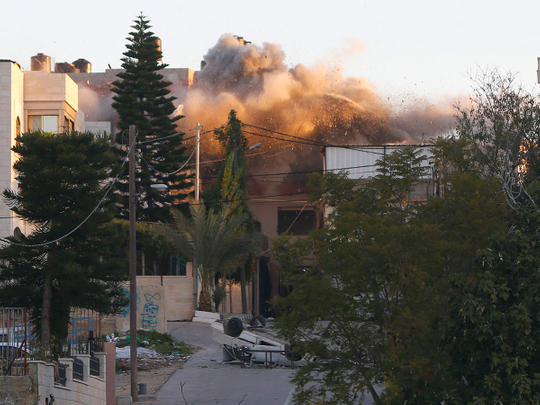
Fatou Bensouda, Chief Prosecutor of the International Criminal Court (ICC), has settled the doubts on the Court’s jurisdiction to investigate war crimes committed in occupied Palestine.
On April 30, Bensouda released a 60-page document laying down the legal bases for that decision, concluding that “the Prosecution has carefully considered the observations of the participants and remains of the view that the Court has jurisdiction over the Occupied Palestinian Territory.”
After years of haggling, the ICC had resolved in December 2019 that, “there is a reasonable basis to proceed with an investigation into the situation in Palestine, pursuant to Article 53(1) of the Statute.”
Expectedly, Israel and its main Western ally, the United States, fumed. Israel has never been held accountable by the international community for war crimes, and other human rights violations in Palestine. The ICC’s decision, especially if the investigation moves forward, would be a historic precedent
Bensouda had already declared that she was, “satisfied that... war crimes have been or are being committed in the West Bank, including East Jerusalem, and the Gaza Strip.”
Expectedly, Israel and its main Western ally, the United States, fumed. Israel has never been held accountable by the international community for war crimes, and other human rights violations in Palestine. The ICC’s decision, especially if the investigation moves forward, would be a historic precedent.
Internal proceedings of ICC
But what are Israel and the US to do when neither are state parties in the ICC, thus having no actual influence on the internal proceedings of the court? A solution had to be devised.
On February 14, Germany filed a petition with the ICC requesting an “amicus curiae”, meaning “friend of the court”, status, which allowed it to submit objections, arguing against the ICC’s earlier decision on behalf of Israel.
Germany, among others, then argued that the ICC had no legal authority to discuss Israeli war crimes in the occupied territories. These efforts, however, eventually amounted to nil.
The ball is now in the court of the ICC Pre-Trial Chamber which consists of judges that authorise the opening of investigations.
The fact that the Palestinian case has been advanced to such a point should be considered a victory for the Palestinian victims of the Israeli occupation.
However, if the ICC investigation moves forward according to the original mandate requested by Bensouda, there will remain major legal and moral lapses that frustrate those who are advocating justice on behalf of Palestine.
Palestinian victims
The legal representatives of the ‘Palestinian Victims Residents of the Gaza Strip’ expressed their concern in a written submission to the Prosecutor regarding “the ostensibly narrow scope of the investigation into the crimes suffered by the Palestinian victims.”
The ‘narrow scope of the investigation’ has thus far excluded such serious crimes as ‘crimes against humanity’. According to the Gaza legal team, the killing of hundreds and wounding of thousands of unarmed protesters, taking part in the ‘March of Return’ is a crime against humanity that must also be investigated.
The ICC’s jurisdiction, of course, goes beyond Bensouda’s decision to investigate ‘war crimes’ only.
Rome Statute
Article 5 of the Rome Statute — the founding document of the ICC — extends the Court’s jurisdiction to the crime of genocide, crimes against humanity, war crimes and the crime of aggression.
It should come as no surprise that Israel is qualified to be investigated on all four points, and that the nature of Israeli crimes against Palestinians tends to constitute a mixture of two or more of these points.
Former UN Special Rapporteur on Palestinian Human Rights (2008-2014), Richard Falk, wrote in 2009, soon after the deadly Israeli war on the besieged Gaza Strip, that “Israeli reliance on a military approach to defeat or punish Gaza was intrinsically ‘criminal’, and as such demonstrative of both violations of the law of war and the commission of crimes against humanity.”
Falk extended his legal argument to a third category, that of “allegation of aggression”. What about the crime of apartheid? Does it fit anywhere within the ICC’s jurisdiction?
The International Convention on the Suppression and Punishment of the Crime of Apartheid of November 1973, defines apartheid as “a crime against humanity and that inhuman acts resulting from the policies and practices of apartheid and similar policies and practices of racial segregation and discrimination ... are crimes violating the principles of international law”
In June 1977, Addition Protocol 1 to the Geneva Conventions designated apartheid as “a grave breach of the Protocol and a war crime.”
It follows that there are legal bases to argue that the crime of apartheid can be considered both a crime against humanity and a war crime.
Former UN Special Rapporteur on Palestinian Human Rights (2000-2006), John Dugard, said, soon after Palestine joined the ICC in 2015, that Israel has established a “system of apartheid in the occupied Palestinian territory.” He further confirmed that, “apartheid is also a crime within the competence of the International Criminal Court.”
Considering the number of UN resolutions that Israel has violated throughout the years, the perpetual occupation of Palestine, the siege on Gaza, and the elaborate system of apartheid imposed on Palestinians through a large conglomerate of racist laws (culminating in the so-called Nation-State Law of July 2018), finding Israel guilty of war crimes, among other “serious crimes”, should be a straightforward matter.
Time will tell how far the ICC is willing to go with its unprecedented and historic attempt aimed at, finally, investigating the numerous crimes that have been committed in Palestine unhindered, with no recourse and no accountability.
For the Palestinian people, the long-denied justice cannot arrive soon enough.
— Ramzy Baroud is a journalist and the Editor of The Palestine Chronicle. He is the author of five books.









